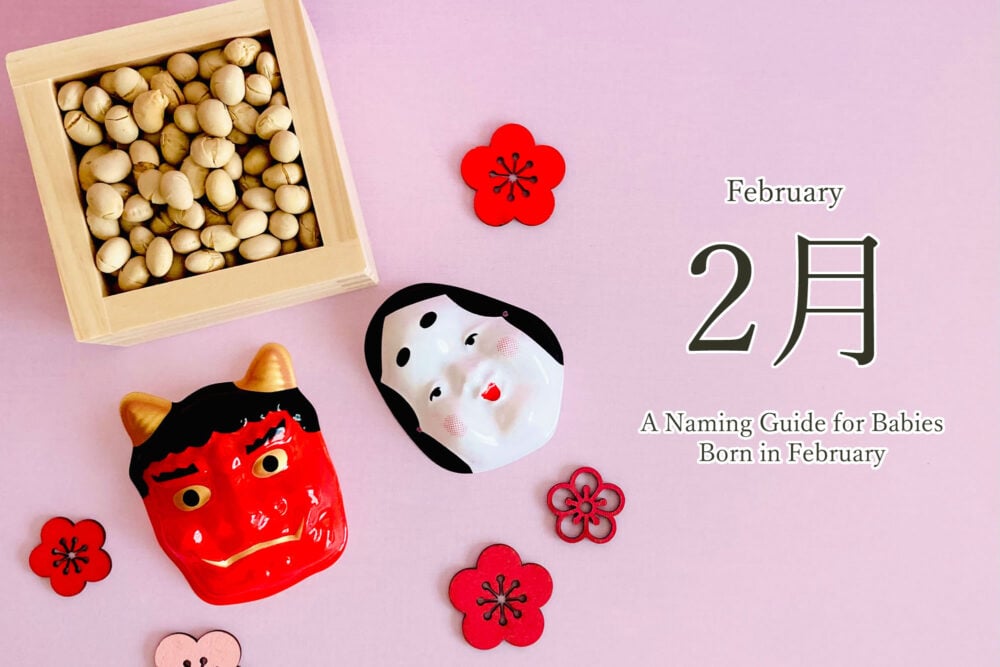Share this link via
Or copy link
Below are navigation links that will take you to the main text and navigation menus.
26,551 first names, 70,620 last names, 333,585 kanji variations.
one of the best Japanese name search tools for your baby!

February in Japan is a special month that bridges winter’s lingering chill and the first signs of spring’s renewal. From the traditional bean-throwing festival of Setsubun to the romantic atmosphere of Valentine’s Day, February holds a wealth of inspiration for baby names. In this article, we explore meaningful kanji, motifs like plum blossoms and camellias, and unique naming ideas that capture the essence of February’s transition from cold to warmth.
Contents
February in Japan is a unique “in-between” month: winter’s chill still lingers, yet the calendar marks the beginning of spring (around February 4th, called “Risshun”). This is also a month of meaningful events:
A baby born in February can be given a name that reflects the transition from cold winter days to the gentle promise of spring. In this guide, we’ll introduce motifs and meaningful characters (kanji) that resonate with February’s spirit, along with plenty of examples for boys, girls, and gender-neutral names.
Below are some popular or meaningful characters you might incorporate into a name. Each symbolizes part of February’s transitional nature or spirit:
Below are sample names grouped by boys, girls, and unisex. Keep in mind that in Japanese naming, the same kanji can often be read in multiple ways, so these are just suggestions.
February stands out as a month of intersection—winter’s end, spring’s soft beginnings, and events like Setsubun or Valentine’s Day. By weaving in references to plum blossoms, leftover snow, or the subtle lengthening of daylight, you can craft a name that resonates with February’s gentle transitions.
Whether you select a name highlighting the pure chill of snow or the hopefulness of budding flowers, a February-born child’s name can capture the essence of anticipation, new life, and cherished traditions. We hope these ideas and examples guide you toward a name that celebrates the season when winter meets spring—and, of course, a lifetime of warmth and happiness for your little one.
Sort by Most Kanji Variations
This is the order of names with many variations of kanji.
Basically, names with more variations are more common and familiar to the Japanese.
Sort by Most Viewed
The names are sorted by the number of times they have been viewed on this site. This ranking is based on the behavior of users around the world, including Japan, so it does not mean that the names are commonly viewed by Japanese people only.
Please note that just because a name has been viewed more times does not mean it is a famous name in Japan.
What is Hiragana?
Hiragana is a syllabary used in written Japanese, which originated from the cursive style of Kanji.
What is Katakana?
Katakana is also a Japanese syllabary. Basically, the characters don't have any meaning by themselves, they only represent the sounds.
Japanese try to express the words came from foreign languages with the most similar sounds in Japanese using Katakana.
What is English Transcription?
English Transcription is a term used when translating Japanese names into English. It represents a romanised version of the name with the aim of reproducing the pronunciation as accurately as possible. English Transcription can also be used for name searches.
Japanese Style Nickname
In Japan, nicknames are commonly used to express familiarity and affection. Here are key features and contexts:
Shortened Forms: Names are often shortened for ease and intimacy, such as 'Yuki' from 'Yukiko' or 'Taka' from 'Takashi'.
Suffixes: Terms like 'chan' for girls and 'kun' for boys are added to names among close friends and family. However, 'chan' can also be used for boys during childhood. Additionally, among adults who are very close, like best friends, 'chan' may still be used to convey affection and familiarity. More Details
Usage and Cultural Aspects: Nicknames are typically used in informal settings among friends, family, or close colleagues, and are not suitable for formal or professional environments. The use of a nickname suggests a degree of intimacy and should reflect the nature of the relationship. Young people often demonstrate creativity in their social interactions by crafting unique nicknames.
Note: In Japanese, the long vowel sound is indicated by a special character called a "chōonpu" (長音符), which looks like a horizontal dash (ー). This character serves to extend the duration of the vowel sound immediately preceding it. For instance, in the name "あーちゃん" (A-chan), the "あ" (A) is extended, producing a prolonged "ah" sound, similar to the "a" in "father."
Households?
The names are sorted by the number of Japanese households where the surname is used.
The more households there are, the more famous and common the surname is.
About this site's data of last names
